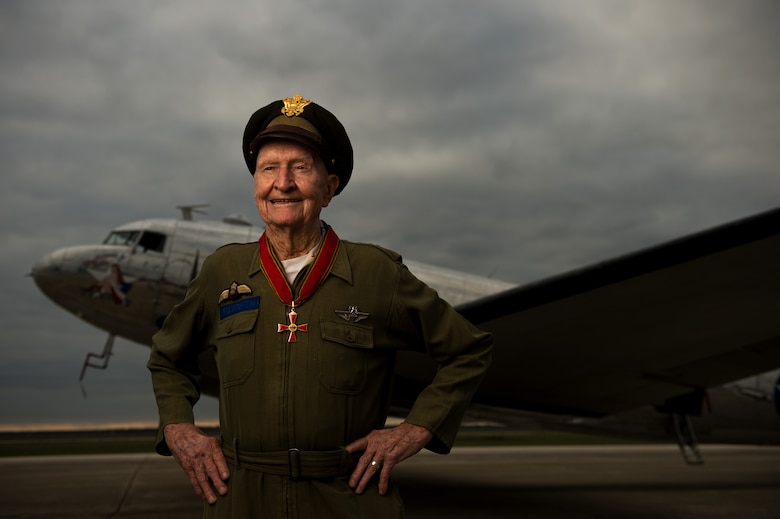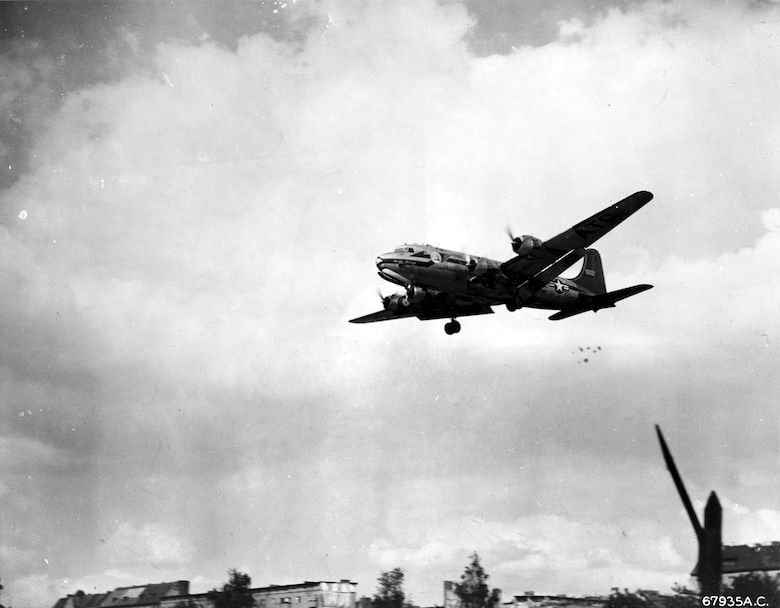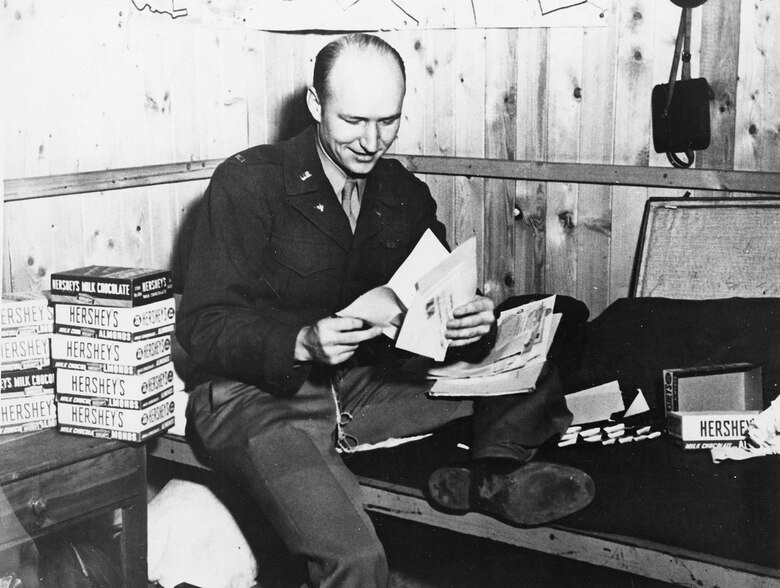The trio shuffled into the small room with canes and walkers to record their testimonies of the first confrontations of the Cold War and how the allies prevailed without firing a shot, saving a former enemy from oppression.
The Royal Air Force Museum American Foundation celebrated the 70th anniversary of the end of Berlin Airlift at their annual "Spirit of the Battle of Britain" banquet last month to honor these veterans for their contributions to the alliance between the United States and the United Kingdom.
The trio retold their stories of using soft air power to deter Soviet aggression in post-World War II Berlin, and current U.S. Air Force and RAF airmen were honored for continuing to further the partnership between the two nations.
Prior to the dinner, the trio transported family, listeners and caregivers back to 1940s Germany.
"I remember the war," said Mercedes Wild, who was seven years old at the start of the Berlin Airlift. "They (Allied bombers) destroyed Berlin. It was a hard time for the kids in West Berlin. Berlin is a destroyed city. We will never forget the sound of the bombers."
After WW II, the German capital was divided with Soviet Russia controlling East Berlin and British, French and American Allies responsible for the west. The city was located more than 100 miles inside the Russian controlled portion of Germany. On June 24, 1948, the Russians implemented a blockade of West Berlin to prevent food and supplies, such as coal, from entering the town. The effort attempted to break the spirit of the West Berlin people to reject democracy and embrace communism.
Enter our veterans and the Berlin Airlift.
United States Air Force Col. Gail Halverson, widely known as the "Candy Bomber," described volunteering for the mission that changed his life and those of millions in West Berlin. Halvorsen, a 28-year-old lieutenant at the time, grew up on a farm in Utah, where helping a neighbor in need was a way of life.
"My dad was an example to me," he said. "He had plenty to do himself, but when a neighbor, a farmer, needed help and couldn't get enough help, my dad would drop some of the things that weren't so important on our farm to help the next-door neighbor."
Halverson saw his first aircraft flying overhead on the farm while he was working the fields. He was hooked and signed up for a non-college pilot training program. Soon he received his flight training and was flying cargo aircraft in Mobile, Alabama. When the word came of the attempts by Russia to stomp out freedom in West Berlin by starving its residents, there was no doubt of his next step.
"I volunteered to fly supplies in early," Halvorsen recalled.
At first, the citizens of West Berlin didn't know what to think of hearing heavy aircraft over their heads again.
"The noise of the airplanes during the airlift in the beginning I feared, because it was the same noise while bombing Berlin," Wild said.
They would soon learn the aircraft were not carrying bombs but food and supplies to keep them alive. The logistics of flying 2.3 million tons of goods and equipment was not without risks. In total, 101 Airmen from around the world perished in the Berlin Airlift.
"Two hundred meters from our house, there was the first airlift airplane crash in the night," Wild remembered. "The next morning I went with my mother. It was destroyed. The two pilots were dead. The people were very sorry about this … They feared that the west Allies would now stop the airlift."
A hard winter already made food in short supply, Wild explained. The only meal she might get would come from school and would sneak part of this food to her mother who was sick. She also took care of the family chickens, whose eggs she would trade on the black market for meat or shoes. Still, none of these hardships compared to the fear of the Russians returning to West Berlin as they had done in the final days of the war.
"The normal West Berliner did not want to become Soviet," she said. "The Soviet regime was near the same as Nazi time and they feared the Russians. They remembered the Russian soldiers."
As Halvorsen flew food and coal into the city of Berlin, a 19-year-old RAF pilot flew gasoline into Berlin.
"The Halifax aircraft was a converted bomber," said Dereck Hermiston. "The bomb racks had been taken and we flew, I think it was 40 or 41, 45-gallon tanks of gasoline. They had wooden beams, and they (used them) to roll these drums up. Quite unstable, and it stank to high hell."
The son of a WW I pilot, Hermiston was among the youngest airmen to participate in flying the airlift. Yet, even as a teenager, the reversal of roles did not escape him even then.
"I realized, as a British officer, that we had bombed, and bombed, and bombed Berlin with the Americans, and it was a reversal," he said. "We were now trying to save the Berliners from what was quite an oppressive regime from the Russians. I met a few Russian officers, and they were very sure they wanted to stop Germany from growing ever again."
There was always worry of an international incident turning the Cold War operation hot, as Hermiston told.
"We were buzzed by a Russian MiG-9 one morning," Hermiston, very much still a kid at heart, said with a chuckle. "I think it was about 4 o'clock in the morning. It was just getting daylight. There was this great shudder, and this fighter aircraft flew underneath us … and looped around us. As he came down, I had no room to maneuver. I suppose he missed us by about 200 to 300 feet. It was enough to make the aircraft shudder. Little things like that I remember because I was frightened."
Despite the harsh weather conditions and aero acrobatic antics of the Soviets, the Allies continued to do what was needed to feed and fuel a city. In some cases this involved evacuating Berliners in need of medical attention.
"I flew out something like 220 people in my aircraft from Berlin that were sick or were children needing operations," Hermiston said. "My aircraft was a tanker aircraft, so they had to sit on these wooden beams that were going up the fuselage in stinking conditions. It stank of petrol oil from all the gasoline. Yet, they were all so very grateful--very, very grateful. I found the people extremely grateful."
The British pilot was not the only person struck by the grateful nature of the people of Berlin. In a previous interview, Halvorsen recalled how he became known as the "Candy Bomber" after a trip to Berlin, seeing children line up along the fence line outside the flightline of the Templehof airport.
"I had been to other countries where the kids had chocolate," he said, recalling that moment nearly 70 years later. "When George Washington visited his troops, he had little hard candies in his pocket for the kids. That was nothing new. But these kids had not had chocolate for a couple of years. Not one out of the 30 broke ranks and said, 'do you got candy?' When I realized that, it just hit me like a ton of bricks--black and white. I just could not believe that quality of character called gratitude. They were so grateful. They were thankful for their freedom. When I realized that, I thought I got to do something. I reached in my pocket, and all I had was two sticks of gum."
Convinced that everyone deserved a treat or no one did, Halvorsen took about three more steps and the little voice came clear as a bell directing him back to the fence.
"Boy, when I stopped and started back, those kids came to attention," he said. "I pulled out two sticks of gum and broke them in half and passed it to the kids doing the translating. I couldn't believe what I saw. The other kids didn't push or shove or try to grab it. The kids that got half a piece of stick of gum tore off the wrapper and passed it. The kids that got a strip of paper, put it up to their noses, smelled it and their eyes got big. They were dumbfounded. They clutched it in their hands to go home and show their parents, if they had any."
An idea came to Halvorsen--return the next day.
"I will be flying overhead, and I will drop enough chocolate for all of you," he announced to the children. "When that translated to everybody, there was a celebration going on."
Halvorsen made one demand of the children. They must share the candy. They agreed, but another question arose. With planes arriving every few seconds, how would the children know which one was Halvorsen's?
"When I would fly over the farm (back home), I would wiggle the wings back and forth. So I said, 'kids, you watch the airplane. When I come over the center of Tempelhof, if it is clear, I will wiggle the wings.' That is how it began."
The "Candy Bomber," with his parachutes of chocolate, was born, and the act would soon be named operation Little Vittles.
One little girl never caught one of the treats--the 7-year-old Wild.
"I was never quick enough," she said.
To make matters worse, the chickens whose eggs brought a fortune on the black market had stopped laying because of the noise from the aircraft landing every few seconds over head.
"Therefore, I decided to write a letter because I was so sad about the situation, and I cried," she said. "My grandmother told me don't cry, don't cry, don't weep, do something. I decided to write a letter."
The letter was addressed to her "Chocolate Uncle," and she asked him to aim his parachute for the garden with the white chickens.
No parachute ever came, despite nearly 20 tons of candy being dropped from the C-54 Skymasters flown by the Americans.
A letter from her "Chocolate Uncle" did come, with two special treats-a lollipop and peppermint-flavored stick of gum. Between the war and the blockade, the smell of peppermint was unknown to the child.
"I exchanged it on the black market, this peppermint gum, for a glass marble; I have this glass marble," Wild said, pulling the smooth glass toy from her pocket and placing it on the table with as much pride as any seven-year-old. "This is the same glass marble."
The lollipop was saved for a Christmas treat, but the greatest gift that day was not the candy.
"The most important was the letter; the letter changed my whole life," she said.
Offered a chance to join an aunt in Switzerland where food and supplies were not held hostage by the Soviets, Wild turned it down with the hopes of one day meeting her "Chocolate Uncle."
Around-the-clock supplies continued flying into Berlin as British and American pilots made three round trips a day. After nearly a year, the Soviets lifted the blockade, reopening the transportation routes on the ground.
"The Soviets gave up," Halvorsen said. "They said we can't compete with that. They got red-faced and backed off. The airlift was the reason they had to do that; it broke the blockade. I was proud to be a part of that."
With the blockade lifted in May 1949, British and American aircraft continued to fly supplies into Berlin to rebuild the stocks. On Sept. 23, 1949, the last RAF aircraft landed in Berlin with supplies.
Time passed, and in 1970, Col. Halvorsen returned to Germany, now as the commander of Tempelhof. A now grown and married Wild decided now was the time to meet her "Chocolate Uncle."
"First, we went to airport Templehof, and I took the letter with me," Wild said. "Then I invited him to our home for dinner with the family."
The two families have remained close all these years.
Seventy years later, these veterans of the Berlin Airlift travel the world telling the story of how the gratitude of the Berlin Airlift shaped their lives and the world.
"We must give the good spirit to the kids to have good society and future…" Wild said. "This was a very good thing that Colonel Halvorsen decided to have those candy droppings because I think he is the best ambassador for mankind--for humanity. It is not only Col. Halvorsen, but the other pilots and the people of Great Britain, South Africa, Canada and USA. The people were standing behind the airlift."

Retired Col. Gail Halvorsen poses for a photo during a Veterans Day event at Hondo Municipal Airport, Texas, Nov. 9, 2013. Halvorsen was called the "Candy Bomber" because he was known to drop candy with attached parachutes to children during the Berlin Airlift. (U.S. Air Force photo by Staff Sgt. Jonathan Snyder)

A C-54 Skymaster piloted by retired Col. Gail Halvorsen drops candy with attached parachutes to children during the Berlin Airlift. Halverson earned the nickname "Candy Bomber" for his operation Little Vittles candy drops. Note the parachutes below the tail of the C-54. (U.S. Air Force photo)

Then-Lt. Gail S. Halvorsen was so impressed by a group of polite German youngsters watching Berlin Airlift operations from outside the fence of the Tempelhof airdrome, he promised to drop candy to them. He used handkerchiefs and scraps of cloth as miniature parachutes, and word of his personal humanitarian mission spread to the United States. Halvorsen, who earned the nickname "Candy Bomber," received the 1948 Cheney Award in recognition of his action. (U.S. Air Force photo)






